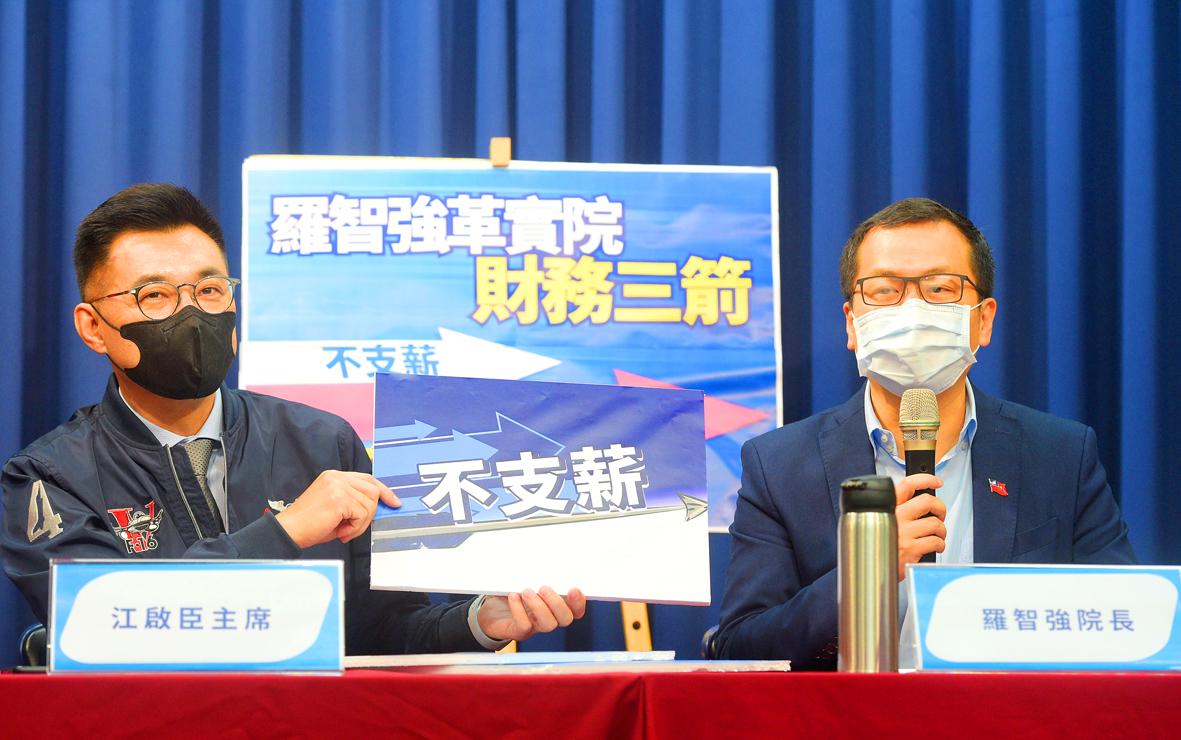Chinese Nationalist Party (KMT) Chairman Johnny Chiang (江啟臣) yesterday said that he hopes the party’s Institute of Revolutionary Practice could become an “important cradle” for attracting and cultivating party talent.
“Although the KMT is poor, it cannot be poor in the area of cultivating talent because talent and discourse are the KMT’s most important assets in the future,” Chiang said at a news conference at the party’s Taipei headquarters to mark Taipei City Councilor Lo Chih-chiang (羅智強) taking over as the institute’s new director, along with deputy directors Yu Shu-hui (游淑慧) and Huang Chien-hao (黃健豪).
The party must show the public through action, not just words, that it wants to develop new talent, he added.

Photo: Chang Chia-ming, Taipei Times
Lo outlined his three major policies for the institute, which has reverted to its original name from the National Development Institute.
He said that he would not take a salary for being its director, although Chiang had told him that the job was an “obligatory post” that came without pay when he offered it to him.
“The KMT is at a historic low point,” Lo said. “The institute has no money and neither does the KMT.”
Lo said he would keep the promise that he made on Jan. 12, the day after the presidential and legislative elections, to donate NT$800,000 (US$26,532) to the KMT’s youth development work once a new party chairperson was elected.
The donation would be made to the institute to help pay its expenses, he said.
Furthermore, the institute is to launch a NT$10 million fundraising drive, he said, adding that details would be released as soon as possible.
While NT$10 million is a small sum for the Democratic Progressive Party (DPP), whose resources are “endless,” it is an “astronomical amount” for the KMT, he added.
For decades the KMT had a reputation as one of the wealthiest political parties in the world.
In July 2018, Ministry of Interior data showed that the KMT had assets totaling NT$18.9 billion (US$626.82 million), while the DPP had assets worth NT$769 million, the Liberty Times (the Taipei Times’ sister newspaper) reported.
However, on Dec. 6 last year, the KMT said it was struggling to pay staff, due to an asset freeze imposed by the Ill-gotten Party Assets Settlement Committee.
The committee said that the KMT had income of NT$420 million in 2018 that had not been frozen.
Additional reporting by staff writer

Taiwan has received more than US$70 million in royalties as of the end of last year from developing the F-16V jet as countries worldwide purchase or upgrade to this popular model, government and military officials said on Saturday. Taiwan funded the development of the F-16V jet and ended up the sole investor as other countries withdrew from the program. Now the F-16V is increasingly popular and countries must pay Taiwan a percentage in royalties when they purchase new F-16V aircraft or upgrade older F-16 models. The next five years are expected to be the peak for these royalties, with Taiwan potentially earning

STAY IN YOUR LANE: As the US and Israel attack Iran, the ministry has warned China not to overstep by including Taiwanese citizens in its evacuation orders The Ministry of Foreign Affairs (MOFA) yesterday rebuked a statement by China’s embassy in Israel that it would evacuate Taiwanese holders of Chinese travel documents from Israel amid the latter’s escalating conflict with Iran. Tensions have risen across the Middle East in the wake of US and Israeli airstrikes on Iran beginning Saturday. China subsequently issued an evacuation notice for its citizens. In a news release, the Chinese embassy in Israel said holders of “Taiwan compatriot permits (台胞證)” issued to Taiwanese nationals by Chinese authorities for travel to China — could register for evacuation to Egypt. In Taipei, the ministry yesterday said Taiwan

Taiwan is awaiting official notification from the US regarding the status of the Agreement on Reciprocal Trade (ART) after the US Supreme Court ruled US President Donald Trump's global tariffs unconstitutional. Speaking to reporters before a legislative hearing today, Premier Cho Jung-tai (卓榮泰) said that Taiwan's negotiation team remains focused on ensuring that the bilateral trade deal remains intact despite the legal challenge to Trump's tariff policy. "The US has pledged to notify its trade partners once the subsequent administrative and legal processes are finalized, and that certainly includes Taiwan," Cho said when asked about opposition parties’ doubts that the ART was

If China chose to invade Taiwan tomorrow, it would only have to sever three undersea fiber-optic cable clusters to cause a data blackout, Jason Hsu (許毓仁), a senior fellow at the Hudson Institute and former Chinese Nationalist Party (KMT) legislator, told a US security panel yesterday. In a Taiwan contingency, cable disruption would be one of the earliest preinvasion actions and the signal that escalation had begun, he said, adding that Taiwan’s current cable repair capabilities are insufficient. The US-China Economic and Security Review Commission (USCC) yesterday held a hearing on US-China Competition Under the Sea, with Hsu speaking on